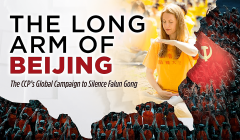Overview of the Chinese Communist Party (CCP)
For anyone raised in the developed west, it can be hard to believe that a persecution of this scale—and against a group of peaceful citizens—could occur in the 21st century.
All the more since many today see China as a nation that has long-since shed the ideological fanaticism and violent tendencies that gave rise to the Cultural Revolution and the crushing of democracy activists on Tiananmen Square. The assumption, perhaps, is that the more liberal economic practices embraced in recent decades are simultaneously giving rise to greater political and civil rights, and that as China plays an increasingly prominent role in the international community, it is bound to become more open, democratic and the rule of law will inevitably take hold.
This view, however, is belied by the Chinese regime’s treatment of the Falun Gong spiritual discipline. Since being banned in 1999, adherents of Falun Gong have been subjected to draconian torture methods in reeducation-through-labor camps, where they are held without trial or conviction. Hundreds of thousands, if not millions of Falun Gong adherents have suffered this fate, and thousands have been tortured to death under orders from China’s central government. And in a grisly revelation that brings to mind the Nazi practice of harvesting human hair for pillow stuffing, there is also damning evidence that the communist party has also been forcibly harvesting and selling the organs of Falun Gong prisoners, killing them in the process.
For those with business or political investments in China, it may be preferable to see the persecution of Falun Gong as a rare exception to the rule – a growing pain, of sorts, on the long march to democratic liberalism. It is convenient to ignore, as well, for anyone unwilling to believe that such actions could occur in the 21st century.
But what if the treatment of Falun Gong, rather than being a historical aberration, is instead the fairest exposition of the true nature of China’s leaders, and the CCP more broadly?
This section of our website — an in particular the Nine Commentaries on the Communist Party — offers readers a rare insight into the nature of the CCP, relayed by those who have lived under its rule for decades, as well as those who have work for its ministries and agencies. This is the story of the CCP from the inside.






